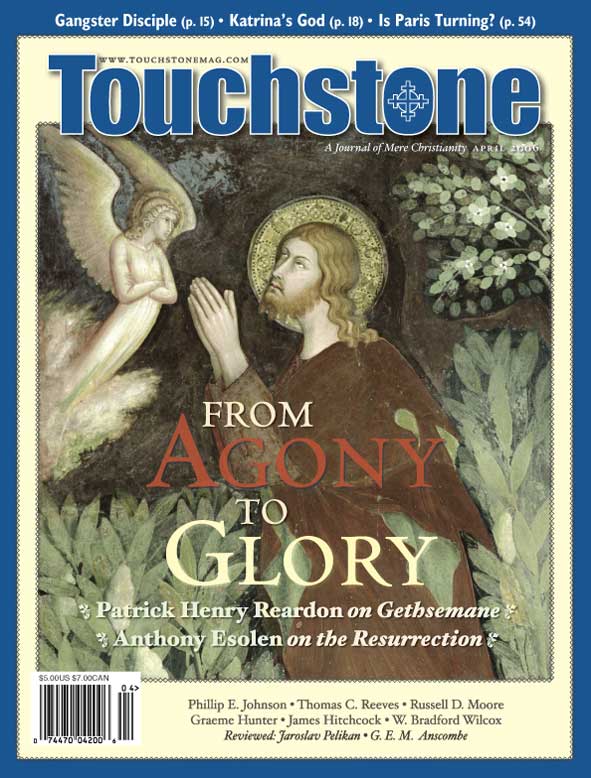A Philosopher’s Gem
Human Life, Action And Ethics: Essays By G. E. M. Anscombe
edited by Mary
Geach & Luke Gormally
Imprint Academic, 2005
(298 pages, $69.90, hardcover)
reviewed by Stewart Goetz
Elizabeth Anscombe (1919–2001) was a first-rate philosopher, who for sixteen years held the chair of philosophy at Cambridge University earlier occupied by her teacher Ludwig Wittgenstein, and, a surprise in the world of academic philosophy, a devout Roman Catholic. Many readers of Touchstone will recognize her name because of her famous critique (delivered at the Socratic Club in Oxford University in 1948) of C. S. Lewis’s argument against naturalism in his book Miracles.
Anscombe’s many academic accomplishments include her translation of Wittgenstein’s Philosophical Investigations and her monograph Intention, which the well-known American philosopher Donald Davidson regarded as the best work on practical reasoning since Aristotle, which is high praise indeed.
As competent as anyone in making the careful philosophical distinctions, Anscombe was equally adept at making fine-grained distinctions in her private life. On one occasion, she pledged to God that she would give up cigarettes, if her son (she and her husband, the philosopher Peter Geach, had seven children) were to recover from a serious illness. After her son got well, and missing the pleasure of tobacco, she concluded that her oath to give up smoking had not included cigars, and so she took up cigar smoking.
Anscombe’s storied private life was complemented by significant social activism. As a young woman she was outspoken in protesting the conferment of an honorary degree on Harry Truman because he had committed murder with the killing of innocents in the bombings of Hiroshima and Nagasaki, and in her later years she was arrested for her pro-life activity.
Being Human
A collection of twenty-three essays largely devoted to moral philosophy, Human Life, Action and Ethics begins with a section about the question of what it is to be human, followed by sections on action and practical reason and on ethics.
The first seven chapters concern the question of what it is to be human and deal with topics such as the existence and nature of the soul and human dignity. In two essays in particular, Anscombe illustrates the importance of the soul and human dignity for practical life by discussing their relevance to the issue of abortion.
She defends the Aristotelian/Thomistic view favored by Catholics that a human being is a living organism in virtue of having a principle of life or soul. Because human beings are capable of reasoning, the human soul is a rational soul. She maintains that a human being has dignity because of his nature as an organism with a rational soul, and this dignity makes the choice to take the life of one who is innocent unjust.
One might be inclined to reason that because a zygote is a human life, it must possess a rational soul and, thereby, be a human being with dignity. Moreover, because it is innocent, aborting it is murder. Anscombe thinks this line of reasoning moves too quickly. What should make us pause is the phenomenon of twinning, which is the early division (perhaps within one week) of one cell cluster into two.
If a zygote were a human being, one would have to acknowledge that one human being could split amoeba-like into two. Anscombe believes that something non-amoeba-like must be going on in twinning. If I understand her view correctly, she maintains that a zygote has a soul of the non-rational, vegetative variety (a vegetative soul explains nutrition and growth) and acquires a rational soul at or immediately after the point at which it does or would twin.
This presents an obvious problem: If a zygote is not yet a human being, how can it be wrong to abort it? In the following way, Anscombe argues: A zygote’s vegetative soul is a principle of unity of or for a new and coming life as a human being. In Aristotelian terms, the rational soul serves as the final cause or teleological explanation for the presence of the vegetative soul.
Because murder is not only unjustly killing an innocent human being but unjustly killing that which will naturally develop into a human being, abortion is murder. Stated slightly differently, given that a zygote’s goal or telos is to develop into a human organism that has dignity, the unjust killing of it exhibits the same malice as the unjust killing of a full-fledged organism with that dignity.
And Not a Worm
Some might rejoin that Anscombe misunderstands the significance of twinning. After all, they might argue, a worm can divide into two whole worms, but no one thinks that the original worm was not a whole living member of its species. So why not think that one whole human being can divide into two whole human beings?
This rejoinder brings to light the difficult problem of stating what it means to be human. A human being seems to possess an ultimate or fundamental unity that makes its division impossible. The evidence for this unity is our first-person self-awareness of ourselves as an “I,” an “I” that seems to be indivisible. In order to make sense of the idea of an entity of a certain kind splitting into two wholes of that same kind, we must assume that that entity is not ensouled with an “I” like our own.
Regardless of which kind of understanding of the human soul one espouses, it is the human soul as that which accounts for our fundamental being as an “I” that complicates the argument against abortion. While human biological life begins at fertilization, the existence and nature of the human soul ensures that twinning poses at least a puzzle, if not an unanswerable problem, for the view that a human being begins to exist at fertilization.
It is because of this puzzle/problem that Anscombe extends the concept of unjust killing to include the unjustified taking of the life of that which is not yet, but will naturally develop into, a human being.
The Oxford Philosophy
Included in the section on ethics is Anscombe’s deservedly famous essay entitled “Modern Moral Philosophy,” in which she criticizes the popular view that there is no act that cannot be justified either by its expected good consequences or by the bad consequences that one would expect to follow from not performing it. Consequentialism, as she called it, is “incompatible with the Hebrew-Christian ethic. For it has been characteristic of that ethic to teach that there are certain things forbidden whatever consequences threaten, such as: choosing to kill the innocent for any purpose, however good. . . .”
Also included in the ethics section is a not-so-well-known piece with the title “Does Oxford Moral Philosophy Corrupt the Youth?” Her answer to this question is “No,” because “in order to show that a certain teaching corrupts people you must obviously show that they have (or would have come to have) better ideas without this teaching. . . . Oxford moral philosophy is perfectly in tune with the highest and best ideals of the country at large.”
What might a list of those ideals include? Anscombe’s first candidate is “one of the most important insights of modern times: that injustice may be nobody’s fault, and that what is required is good arrangement.” Another is that “if something seems in itself a bad sort of action, but you calculate that if you do not do it then the total situation . . . will be worse than if you do it—then you must do it.”
I could only chuckle when reading this essay because of an experience of my own while a student at Oxford. I needed to read an assigned journal article, and went to the philosophy library to get it. Upon pulling the relevant volume off the shelf, I discovered that the article was missing. It had been neatly cut out, presumably with a razor blade. I reported the matter to the librarian, who looked at me dolefully and asked, “Sir, do you know where most thefts occur in this library?” Clueless, I answered “No.” “From the morrrrals section, Sir. The morrrrals section.”
Rewarding Philosophy
Human Life, Action and Ethics is a thought-provoking book by one of the best Christian philosophers of the last century. Readers, however, need to be warned: For the most part it is not an easy book to read. As the editors (a daughter and son-in-law) state, “It is hard to know sometimes whether it would be more clarificatory to go on to the next sentence, or to return to the previous one.”
Readers should roll up their sleeves before they open this book. If they do, they will be well rewarded.
subscription options
Order
Print/Online Subscription

Get six issues (one year) of Touchstone PLUS full online access including pdf downloads for only $39.95. That's only $3.34 per month!
Order
Online Only
Subscription

Get a one-year full-access subscription to the Touchstone online archives for only $19.95. That's only $1.66 per month!
bulk subscriptions
Order Touchstone subscriptions in bulk and save $10 per sub! Each subscription includes 6 issues of Touchstone plus full online access to touchstonemag.com—including archives, videos, and pdf downloads of recent issues for only $29.95 each! Great for churches or study groups.
Transactions will be processed on a secure server.
more from the online archives

24.6—Nov/Dec 2011
Liberty, Conscience & Autonomy
How the Culture War of the Roaring Twenties Set the Stage for Today’s Catholic & Evangelical Alliance by Barry Hankins
calling all readers
Please Donate
"There are magazines worth reading but few worth saving . . . Touchstone is just such a magazine."
—Alice von Hildebrand
"Here we do not concede one square millimeter of territory to falsehood, folly, contemporary sentimentality, or fashion. We speak the truth, and let God be our judge. . . . Touchstone is the one committedly Christian conservative journal."
—Anthony Esolen, Touchstone senior editor








